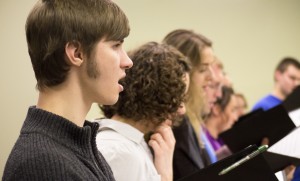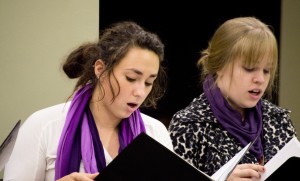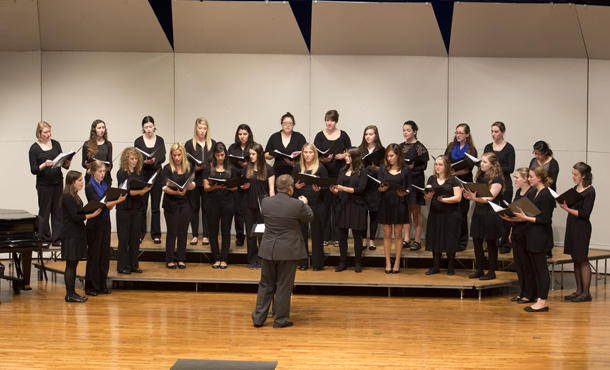The annual gala concert at Eastern Mennonite University is “a kaleidoscope,” says music professor Ken J. Nafziger, who conducts the chamber choir. Around the fixed theme of a musical showcase to kick off the holiday season, a variety of talents, ensembles, and compositions rotate into new permutations each year.
The Nov. 15 event at Lehman Auditorium includes a collaborative performance of Handel’s “Messiah” and two pieces composed by new professor Ryan Keebaugh, as well as a wide variety of selections from the campus’s musical community. The performance begins at 7 p.m. Admission is free, but a suggested donation of $10 per person benefits the music scholarship fund.
The wind ensemble, with more than 25 student musicians, will open the gala with Jean-Joseph Mouret’s “Suite des Symphonies.” Conductor John Dull appreciates the increased exposure the group will receive, as the gala is their largest audience of the year.

The centerpiece of the concert is the popular Part I of Handel’s “Messiah,” performed by the Chamber Singers, men’s and women’s choirs, with the orchestra. Popularly called the “Christmas” movement, Part I celebrates the birth of Jesus and ends with the rousing “Hallelujah” chorus.
“Every student should have a chance to sing it or play it some time,” says Nafziger, of the Baroque oratorio.
Music professor Joan Griffing, the orchestra’s conductor who will play the violin as well, says she enjoys the camaraderie of playing alongside her students. “The collaboration is what I really enjoy,” she says.
Preparatory music instructor Christa Hoover and graduate student Katrina Gehman will also play violin in the gala as soloists in Sarasate’s “Navarra” with the orchestra, a “super effervescent, whirlwind violin duo,” says Hoover.
Both violinists are Wheaton College alumni now teaching with the Harrisonburg City Schools String Program. Their friendship contributes to the close listening required to harmonize in the duet. Gehman, who has played violin since she was eight, hopes “that the audience in this gala can connect through the music with the parts of themselves that cannot be expressed in words, and yet still long to speak.”
Sharing personal experience and reflective moments are also what rewards Keebaugh when writing music. The chamber choir and string quartet will perform one of his compositions, titled “…Thy light which is brighter than the sun and the moon.” Keebaugh wrote the piece for Winchester’s Musica Viva concert last year in tribute to Jim Harmon, a beloved Virginian singer who died of cancer.
“It was an act of love and sorrow and respect,” said Nafziger, who upon hearing the piece, immediately wanted the chance to conduct it.

“To have that honor to commemorate someone’s life in a piece of music is a wonderful thing,” said Keebaugh. The piece, which revolves around themes of light and dawn, took him eight months to compose.
Junior Sarah Sutter will sing the melody in Keebaugh’s adaptation of “The Lord’s Prayer” with the women’s choir. She appreciates the unique opportunity to work with the composer and learn the inspiration and intent behind the music. In this version of “The Lord’s Prayer,” the choir surrounds the audience while mimicking the echoes of singing in a cave or cathedral. With this format, Keebaugh intends to make the audience part of the ensemble – breaking down the “us versus them” structure of traditional performance to better commune the personal sacred themes he writes into music.
Other musical numbers include Bartok’s “Romanian Folk Dances,” a contemporary orchestra piece, and “Music Down in My Soul,” a spiritual arrangement by Moses Hogan in the chamber singers’ repertoire.
“Even if you think that classical music isn’t your thing, you should come and give it a shot,” says Sutter. “We’re doing things in a whole range of styles and eras, so come and listen before you say you don’t like it!”
For more information, contact the EMU music department at 540-432-4225.
